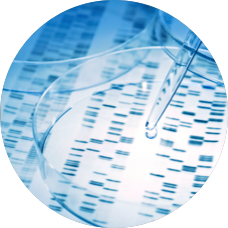Genetic ALS:
counseling and communication
Supporting patients living with ALS / Counseling and communication
Building meaningful relationships
Robert Bucelli, MD, PhD, Associate Professor of Neurology at the Washington University School of Medicine in St. Louis, has treated many patients with genetic ALS in his decade of practice. While delivering an ALS diagnosis remains one of the most difficult challenges Dr. Bucelli faces, his approach to that conversation and all the others that follow helps him build meaningful and productive relationships with his patients and their caregivers.1 Here, Dr. Bucelli shares provides his patients with care and guidance.
Meeting patients on their terms
I believe every patient with ALS has a unique perspective, informed by their culture, their age, their family, and the things that happened to them when they were young. This perspective will often have an influence on how they approach the news of their diagnosis and their illness. I believe it is my job to understand that perspective so I can provide the most optimal care possible.
The first thing to note is that delivering an ALS diagnosis will always be difficult.1
Being clear and honest with the patient about the gravity of the diagnosis is hugely important to me. But so is offering comfort. There is literature available that outlines approaches for these conversations, and anyone with a medical degree has certainly studied this.2 But the reality of these conversations, is never quite the same as what you learn in school.
I always try to remember that this interaction is occurring in the context of an incredibly emotional time.1 And emotions are unpredictable.
I’ve seen some cases where the patient or the patient’s caregiver may be angry and unable to hear anything being discussed beyond the diagnosis itself. I try to have the confidence to stay calm and empathetic in moments like this. Anger is a common reaction to bad news, and individuals often need an outlet for their fear. That may mean their anger is directed at the person delivering the news. Sometimes I wait until the patient is more prepared to hear what else I have to share before I deliver additional information beyond the diagnosis itself, and offer a follow-up appointment soon after the initial visit.2
On the other hand, some patients may be immediately engaged and eager to learn everything they can about their diagnosis. Patients with this mindset may be ready to talk about possible next steps within minutes of receiving the diagnosis. They will likely have a lot of questions and I believe it is important to match their interest and engagement.2
There is no easy way to predict how a patient will react to their diagnosis. But it is important to be open to and supportive of that reaction, no matter what it is.2
Importance of early diagnosis
I believe that patients benefit from knowing their diagnosis as early as possible.2 There are many reasons for this, not least of which is the urgency to provide patients with the appropriate care in the appropriate way. For instance, there is evidence of better quality of life and prolonged survival of 7-10 months1,3 in patients cared for in ALS centers and multidisciplinary clinics compared to those treated in non-multidisciplinary settings.
However, we also see that the diagnostic journey for some patients takes many paths that result in striking delays. Multiple factors can contribute to this diagnostic delay, including under-recognition of early ALS symptoms and, consequently, late referrals to ALS specialists.1
This is yet another reason I believe early diagnosis is so important.
The intricacies of genetic ALS
I believe genetic testing should be considered for all patients with ALS—even patients who do not have a family history of the disease. In fact, we now believe that approximately 10% of patients with no documented family history of ALS still carry a genetic mutation that may have contributed to their disease.4
I make it a point to obtain a patient's family history. I am particularly interested in family members who may have experienced conditions which share a close genetic relationship to ALS.4 I always learn all I can about the exact medical history of a patient’s first-degree relatives so I can gain a better understanding of the medical conditions present, as well as the cause and age of death of these relatives as this may help me understand factors contributing to genetic penetrance.4
I perform this sort of pedigree analysis along with—rather than in place of—genetic testing. Many patients are already well informed about ALS and may inquire about testing even before a physician introduces the topic. Whoever broaches the subject, I like to provide some information upfront about the medical basics of genetics and genetic ALS. This includes an overview of genetic penetrance and the fact that not everyone with a mutation is necessarily going to develop ALS symptoms, the difference between dominant and recessive disorders, and the implications of test results for family and first-degree relatives.4
Even with explanations like these, reactions to the idea of genetic testing may be mixed. I believe some patients are empowered by knowledge: the more they can understand about ALS and its implications, the better they are able to cope with their diagnosis.2,5
For other patients, the idea of discovering a family connection—something they could pass on—may invoke feelings of fear and guilt at the idea that they could somehow hurt a loved one. This is one of the reasons I like to stay away from terms like “familial ALS” and prefer instead to say “genetic ALS.” Whatever words I use, I make it a point to reassure patients they have done nothing wrong. This is a disease associated with their biology. It does not mean they did or will do anything to hurt a loved one.
I encourage my patients to meet with a genetic counselor. The services of a skilled genetic counselor may be helpful to a patient before they undergo testing as well as when testing is complete. Patients may benefit from a reliable source of information and support as they unpack the many layers that can come with receiving these results.4
Discussing clinical trial participation
Conversations about clinical trial participation should, I think, result in an understanding of what each patient hopes to gain from participation. I try to explain that, if the trial in question is placebo-controlled, there is a chance the patient will receive the placebo rather than the investigational drug. While providing this kind of information may lead to further disappointment in what is already an emotionally charged moment, it is important to me to be open and honest with patients, and to set realistic expectations. Based on my experience, participants armed with knowledge of what trial participation entails are generally more likely to be committed to furthering disease knowledge for the benefit of the overall ALS community.5
I try to help patients understand that there may be forces outside of their control that limit their ability to participate in a trial. Some examples of these forces are the inclusion and exclusion criteria, difficulties associated with frequent travel to the trial site or ALS center, or, in some cases, a diagnosis that comes too late in the course of the illness to make participation in trials an option. This is yet another reason why I emphasize the importance of early diagnosis.2
For those patients who do enroll in a trial, I believe discussions should be ongoing. When trial data appear encouraging, I try to remain reserved and use the term “cautious optimism”. Here, we see the importance of realism.2 It would be wrong to expect a patient or caregiver not to develop expectations when it comes to clinical trial participation. But as a physician and ALS specialist, I believe everyone who participates in these trials should be motivated not only by their potential benefits, but by what their participation could do for the ALS community at large.5
References: 1. Hogden A, Foley G, Henderson RD, James N, Aoun SM. Amyotrophic lateral sclerosis: improving care with a multidisciplinary approach. J Multidiscip Healthc. 2017;10:205-215. 2. Andersen PM, Abrahams S, Borasio GD, et al; for EFNS Task Force on Diagnosis and Management of Amyotrophic Lateral Sclerosis. EFNS guidelines on the clinical management of amyotrophic lateral sclerosis (MALS)—revised report of an EFNS task force. Eur J Neurol. 2012;19(3):360-375. 3. Chio A, Bottachhi E, Buffa C, et al. Positive effects of tertiary centres for amyotrophic lateral sclerosis on outcome and use of hospital facilities.J Neurol Neurosurg Psychiatry. 2006;77:948-550. doi: 10.1136/jnnp.2005.083402. 4. Roggenbuck J, Quick A, Kolb SJ. Genetic testing and genetic counseling for amyotrophic lateral sclerosis: an update for clinicians. Genet Med. 2017;19(3):267-274. 5. Benatar M, Stanislaw C, Reyes E, et al. Presymptomatic ALS genetic counseling and testing: experience and recommendations. Neurology. 2016;86(24):2295-2302.
1. Hogden A, Foley G, Henderson RD, James N, Aoun SM. Amyotrophic lateral sclerosis: improving care with a multidisciplinary approach. J Multidiscip Healthc. 2017;10:205-215. 2. Andersen PM, Abrahams S, Borasio GD, et al; for EFNS Task Force on Diagnosis and Management of Amyotrophic Lateral Sclerosis. EFNS guidelines on the clinical management of amyotrophic lateral sclerosis (MALS)—revised report of an EFNS task force. Eur J Neurol. 2012;19(3):360-375. 3. Chio A, Bottachhi E, Buffa C, et al. Positive effects of tertiary centres for amyotrophic lateral sclerosis on outcome and use of hospital facilities.J Neurol Neurosurg Psychiatry. 2006;77:948-550. doi: 10.1136/jnnp.2005.083402. 4. Roggenbuck J, Quick A, Kolb SJ. Genetic testing and genetic counseling for amyotrophic lateral sclerosis: an update for clinicians. Genet Med. 2017;19(3):267-274. 5. Benatar M, Stanislaw C, Reyes E, et al. Presymptomatic ALS genetic counseling and testing: experience and recommendations. Neurology. 2016;86(24):2295-2302.







